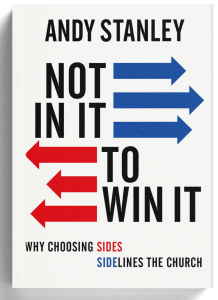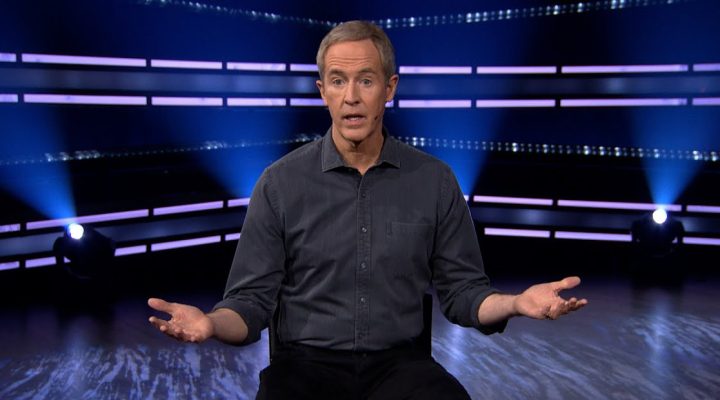Critics say Andy Stanley doesn’t take political involvement seriously. He begs to differ.
The author of a new book titled Not In It To Win It, Stanley is a man on a mission to challenge the American evangelical church to have Jesus as the focus when thinking and speaking on politics.
“This is not an anti-American message at all. It’s not an anti-patriotic message. It’s not a ‘don’t get involved’ message. In fact, in the book, I say, ‘You should be as politically involved as possible. Everybody should vote their law-of-Christ-informed conscience.’
 “So this isn’t, you know, ‘Withdraw!’ This is, ‘What is our priority?’ And as Jesus followers, it’s ‘one nation under God’; it’s not ‘one God under nation.’”
“So this isn’t, you know, ‘Withdraw!’ This is, ‘What is our priority?’ And as Jesus followers, it’s ‘one nation under God’; it’s not ‘one God under nation.’”
Stanley, senior pastor of North Point Community Church in Atlanta, is one of the best-known pastors in America today. He’s a major influencer among conservative evangelicals, although he sometimes surprises with his deviations from the party line. As the son of TV preacher and former Southern Baptist Convention President Charles Stanley, Andy Stanley frequently charts his own path.
When asked why he decided to write a book on politics, he gave a matter-of-fact answer: “This was not on the radar for me. However, watching the fall 2020 election and everything that happened after that — coming through COVID, all the cultural stuff we’ve been through — watching certain evangelical leaders and their reaction to all of these things was so disheartening at times.
“It made me so angry most of the time that I was just embarrassed.”
“It made me so angry most of the time that I was just embarrassed. And then as, you know, the news chases the extremes, there’s no news in the middle. There’s only news in the extremes, right? So as the news and the media covered these extreme statements where these people just went all in, I (realized I) have a platform to be more critical of that group because I’m very conservative politically.”
Like many other traditional Christians, Stanley could hardly believe what he witnessed from those who claimed to speak for God.
“Watching evangelical pastors primarily on the right basically abandon what seemed to me to be the Great Commission and so politicize their churches, politicize their platforms, politicize their broadcast, their podcasts,” he said sorrowfully, “I just couldn’t believe it. I was embarrassed. And so, I started writing what I thought would be an essay, then maybe an article. I called the publisher and said, ‘Hey, you may not want to publish this. I just feel like somebody needs to say something.’”
That essay quickly became a book. In writing, he was guided by a principle he learned as a young person about discussing politics as a pastor: “Talking about it is never enough. If you want to get a coherent message out where people understand, the full breadth of what you’re trying to say, you have to write about it.”
Still, this was a tumultuous journey for Stanley — one that included postponing a parenting book he and his wife, Sandra, had been working on. “Sandra gave me the green light to write this book first,” he said, although he also added, “Our parenting book will be out in January next year.”
The message Stanley says he wants to get across to his evangelical audience is not to forget the “mission” is that of a higher calling. He understands the desire for Christians in his camp to want to be part of the political process. But he wants to make it clear that evangelicals should not forget about their deeper calling, which he took from his church’s mission statement: “To inspire people to follow Jesus.”
Publicity for the book explains: “The church is not here to win. By every human measure, our Savior lost. On purpose. With a purpose. And we are his body. We are not in it to win anything. We are in it for something else entirely. That something else is what this book is about.”
Still, as a pastor of one of the 10 largest churches in America, Stanley feels firsthand the pains of division over politics in churches today. His church, too, has people walk away over politics.
“I sit down at my kitchen counter or during the day and call every single person I can.”
Stanley’s solution is basic and in keeping with the ethos of his book: He calls them and asks if they would like to talk.
“I sit down at my kitchen counter or during the day and call every single person I can,” he explained. In some cases, members don’t really believe it’s him calling. But after ice-breakers and small talk, the issue always boils down to one primary thing: “They were upset with what I wouldn’t say.”
Stanley knows being a pastor with tremendous influence doesn’t exclude him from criticism. But having the conversation always is the start.
And in his view, if there is any hope for evangelicals to change their often negative political perceptions from outsiders, getting back to inspiring people to follow Jesus seems to be the only viable solution.
Related articles:
The politics of nothing and the enabling church | Opinion by Rodney Kennedy


